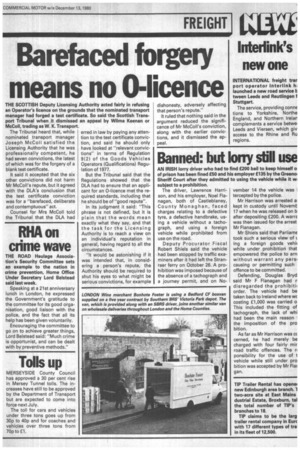Barefaced forgery means no 0-licence
Page 21

If you've noticed an error in this article please click here to report it so we can fix it.
THE SCOTTISH Deputy Licensing Authority acted fairly in refusing an Operator's licence on the grounds that the nominated transport manager had forged a test certificate. So said the Scottish Transport Tribunal when it dismissed an appeal by Wilma Keenan or McColl, trading as W. K. Transport.
The Tribunal heard that, while nominated transport manager Joseph McColl satisfied the Licensing Authority that he was professionally competent, he had seven convictions, the latest of which was for the forgery of a blank test certificate.
It said it accepted that the six other convictions did not harm Mr McColl's repute, but it agreed with the DLA's conclusion that the test certificate conviction was for a "barefaced, deliberate and contemptuous" act.
Counsel for Mrs McColl told the Tribunal that the DLA had erred in law by paying any attention to the test certificate conviction, and said he should only have looked at "relevant convictions" in terms of Regulation 9(2) of the Goods Vehicles Operators (Qualifications) Regulation of 1977.
But the Tribunal said that the Regulations showed that the DLA had to ensure that an applicant for an 0-licence met the required standards, including that he should be of "good repute".
In its judgment it said: "This phrase is not defined, but it is plain that the words l mean exactly what they say, and that the task for the Licensing Authority is to reach a 4iew on an individual's reputation in general, having regard to all the circumstances.
"It would be astonishing if it was intended that, in considering a person's repute, the Authority should be required to shut his eyes to what might be serious convictions, for example dishonesty, adversely affecting that person's repute."
It ruled that nothing said in the argument reduced the significance of Mr McColl's conviction, along with the earlier convictions, and it dismissed the appeal.
















































































































